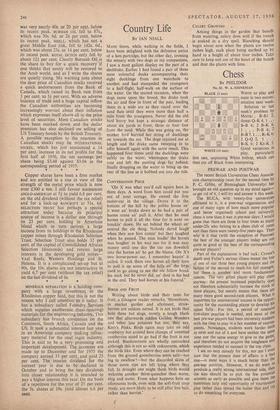Chess
BY PHI LIDOR No. 63. W. A. SHINKMAN
BLACK (3 men)
WHITE (10 men)
WHITE tO play and mate in two moves: solution next week.
Solution to last week's problem by Morra: . B–Kt 2, threat Q–K 4. I .. • B–B 4; 2 B–K 6. 1 . . . P–B 4; 2 B–B 7. 1 . . . R–K 4; PREWAR AND POSTWAR
The recent British Universities Chess Associa- tion championship (won for the second time by P. C. Gibbs, of Birmingham University) has brought an old question up in my mind again-- to get rid of it, I will try and answer it this week.
The BUCA, with twenty-five universities affiliated to it, is a post-war organisation and one of many signs of how much more popular sand better organised) school and university chess is now than it was in pre-war days: 1 would guess that there are three to four times as manY under-25s who belong to a chess club of sonic sort than there were twenty-five years ago. Then why is it that (with the exception of Penrose) the best of the younger players today are not quite as good as the best of the corresponding pre-war players?
Part of the explanation is bad luck; Crown's death and Fuller's serious illness meant the loss of one of our three best young players and the failure of the second to reach his full strength, but there is another and more fundamental reason. The very gifted player will play chess anyway: the present increased popularity does, not therefore substantially increase the stock of these players, but merely means that there are many more good second-rank players. What is important for international success is the oppor' tunity for the outstanding player to develop his talent fully. For this, a period of intensive first-class practice is needed, and most ,of the best pre-war players had been university students with the time to play in a fair number of tourna- ments. Nowadays, students work harder both in term and out of it and have neither the salve time nor the same energy to give to the garne; and therefore do not acquire the toughness and experience needed to succeed in the top class. I see no easy remedy for this, nor am I eve°, sure that the present state of affairs is a bad one—in most ways it is much better than the pre-war position. However, if we do want to produce a really strong international side, then the aim should be to pick the few potential winners as early as possible and give them the maximum help and opportunity of tournament play rather than spread the butter thin and 11 to do something for everyone.


































 Previous page
Previous page